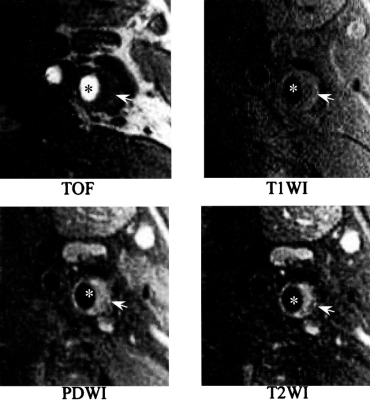Stenosis Classification Using Joint MR Intensities
Student: Benjamin ZaminerAdvisor: Nassir Navab, Holger Poppert, M.D. (Klinikum rechts der Isar, Neurology Dept.)
Supervision by: Andreas Keil
Abstract
Stroke is the third leading cause of death in Germany. It is a neurology injury, whereby the oxygensupply to parts of the brain gets cut off. About 80% of these strokes are due to ischemia, i.e. an occlusion of a bloodvessel leading to an interrupted blood flow.
Stenosis inside the carotid artery imaged using four different MR weightings
Progress
- The project's kick-off presentation, held on 2006-07-14.
Literature
- [Nighoghossian2005] Norbert Nighoghossian, Laurent Derex, and Philippe Douek: The Vulnerable Carotid Artery Plaque, Stroke, 36:2764-2772, 2005, doi:10.1161/01.STR.0000190895.51934.43
- [Clarke2006] Sharon E. Clarke, Vadim Beletsky, Robert R. Hammond, Robert A. Hegele, and Brian K. Rutt: Validation of Automatically Classified Magnetic Resonance Images for Carotid Plaque Compositional Analysis, Stroke, 37:93-97, 2006, doi:10.1161/01.STR.0000196985.38701.0c
| Students.ProjectForm | |
|---|---|
| Title: | Stenosis Classification Using Joint MR Intensities |
| Abstract: | |
| Student: | Benjamin Zaminer |
| Director: | Prof. Dr. Nassir Navab |
| Supervisor: | Andreas Keil |
| Type: | Project |
| Area: | |
| Status: | finished |
| Start: | 15/05/2006 |
| Finish: | 01/02/2008 |